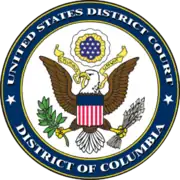Mills v. Board of Education of District of Columbia
Mills v. Board of Education of District of Columbia, 348 F. Supp. 866 (D.D.C. 1972), was a lawsuit filed against the District of Columbia in the United States District Court for the District of Columbia. The court ruled that students with disabilities must be given a public education even if the students are unable to pay for the cost of the education.[1] The case established that "all children are entitled to free public education and training appropriate to their learning capacities".[2] Peter D. Roos, a former staff attorney at Harvard University's Center for Law and Education, described Mills as a "leading case" in a series of lawsuits that attempted to provide access to education for children with disabilities.[3]
| Mills v. Board of Education of District of Columbia | |
|---|---|
 | |
| Court | United States District Court for the District of Columbia |
| Full case name | Peter Mills et al. v. Board of Education of District of Columbia et al. |
| Decided | August 1, 1972 |
| Docket nos. | Civ. A. No. 1939-71 |
| Citation(s) | 348 F. Supp. 866 |
| Court membership | |
| Judge(s) sitting | Joseph Cornelius Waddy |
Children were denied educational opportunities because they were considered to be "exceptional" which included "mentally retarded, emotionally disturbed, physically handicapped, hyperactive and other children with behavioral problems".[4] The board of education did not provide schooling for these children, which violated their own board regulations. 18,000 similar cases were discovered in the Washington D.C. area at the time. It had failed to provide due process hearings and periodic reviews of each exceptional student case. D.C.'s board of education claimed it would take "millions of dollars" to create conditions in the school district to adequately provide education for all exceptional students. The court disagreed, and they ordered the district to serve all students, regardless of disability, in a lengthy and thorough decree. This case predates the Rehabilitation Act of 1974, which protects students with disabilities under any program or activity receiving Federal financial assistance (such as public education).
References
- Mills v. Board of Education of District of Columbia, 348 F. Supp. 866, 877-78 (D.D.C. 1972).
- Henry A. Beyer, A Free Appropriate Public Education, 5 W. New Eng. L. Rev. 363, 365 (1983).
- Peter D. Roos, The Potential Impact of Rodriguez on Other School Reform Litigation, 38 Law & Contemp. Probs. 566, 572 (1974).
- Yudof, M.G., Levin, B., Moran, R.F., Ryan, J.E., & Bowman, K.L. (2012). Education Policy and the Law.CS1 maint: multiple names: authors list (link)
External links
- Text of Mills v. Board of Education of District of Columbia, 348 F. Supp. 866 (D.D.C. 1972) is available from: CourtListener Justia